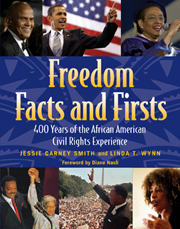Black First of the Day
Who was the first black U.S. senator?
- From Mississippi.
- He was educated by Quakers.
- He later served as the first president of the newly founded Alcorn College for Negroes.
- He was elected to fill the vacated seat of Confederate President Jefferson Davis.
1870
Hiram Rhoades [Rhodes] Revels (1822-1901)
Hiram Rhoades [Rhodes] Revels (1822-1901), was the first black U.S. senator. He was elected to fill the vacated seat of Confederate President Jefferson Davis on January 20, 1870. He was born of free parents in North Carolina, and educated by Quakers in North Carolina, and at Knox College in Illinois. He became a minister in the African Methodist Episcopal Church, a teacher, and a Freedman's Bureau worker in Mississippi. He was elected to the Mississippi state senate in 1869, and elected U.S. senator by the legislature. He served from February 21, 1870, to March 3, 1871. After serving in the Senate, he served as the first president of the newly founded Alcorn College for Negroes. He remained active in the powerful circles of his church.
Sources: Bennett, Before the Mayflower, p. 487; Logan and Winston, Dictionary of American Negro Biography, pp. 523-24; Robinson, Historical Negro Biographies, p. 116; Smith, Notable Black American Men, pp. 1005-8.
From Black Firsts: 4,000 Ground-Breaking and Pioneering Events by Jessie Carney Smith, © 2013 Visible Ink Press®. A celebration of achievement, accomplishments and pride.
| < Previous Fact | Next Fact > |
Dig deeper with these related titles:
 |
Black Firsts: 4,000 Ground-Breaking and Pioneering Events, Third Edition Achievement engenders pride, and the most significant accomplishments involving people, places, and events in black history are gathered in Black... Read More » |
ISBN: 9781578593699 $34.95 |
 |
African American Almanac: 400 Years of Triumph, Courage and Excellence A wealth of milestones, inspiration, and challenges met. . . The most complete and affordable single-volume reference of African... Read More » |
ISBN: 9781578593231 $29.95 |
 |
Freedom Facts and Firsts: 400 Years of the African American Civil Rights Experience Spanning nearly 400 years from the early abolitionists to the present, this guide book profiles more than 400 people, places, and events that have... Read More » |
ISBN: 9781578591923 $44.95 |
 |
Black Heroes "If there is no struggle, there is no progress," wrote Frederick Douglass. "This struggle may be a moral one; or it may be a physical one; or it may... Read More » |
ISBN: 9781578591367 $69.95 |




